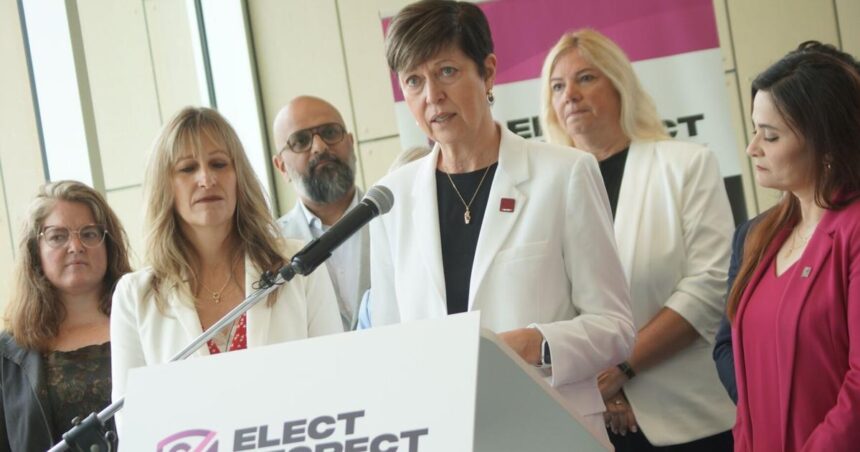Article – I’ve spent the past week reviewing dozens of emails, text messages, and social media posts targeted at Halton politicians. The disturbing pattern that emerged speaks to a troubling new reality for our elected officials: governance under siege.
“I’ve been called every name you can imagine,” Burlington Mayor Marianne Meed Ward told me during an interview at City Hall. “But when someone threatens to come to my home, that crosses a line that affects my family’s sense of security.”
The growing hostility toward politicians isn’t just a Halton problem. Across Canada, elected officials are facing unprecedented levels of harassment, intimidation and threats. Last month, the Canadian Association of Municipal Administrators released findings showing 92% of surveyed municipal leaders had experienced harassment, with 75% reporting those incidents had increased in frequency and severity over the past three years.
Regional Chair Gary Carr didn’t mince words when we spoke. “What we’re seeing is criminal behavior,” he said. “We need to call it what it is and address it with appropriate consequences.”
Documents obtained through freedom of information requests show Halton Regional Police responded to 17 threat investigations involving local politicians in 2023 alone—nearly triple the number from 2019. The threats ranged from vague intimidation to specific, actionable threats requiring police protection.
The toxicity has reached such levels that several councillors across Halton municipalities told me they’re reconsidering running for re-election. Milton Councillor Sameera Ali shared that the personal toll has become overwhelming. “I entered politics to serve my community, not to have my children ask why someone posted our home address online with threatening messages.”
When harassment crosses into criminal territory, police response becomes critical. Halton Regional Police Inspector Jeff Sandy explained their approach: “We take every threat seriously. When criminal thresholds are met—uttering threats, criminal harassment, intimidation—we pursue charges. Five such cases have resulted in charges since 2022.”
Legal experts point to gaps in current enforcement. “The criminal code provisions exist, but the digital nature of many threats creates jurisdictional and evidence-gathering challenges,” said Catherine McKenna, former federal minister who has advocated for stronger protections after experiencing threats herself.
At a recent regional council meeting, Oakville Mayor Rob Burton proposed a resolution calling for amendments to the Municipal Act that would give municipalities greater authority to protect elected officials and staff. The resolution passed unanimously and has been forwarded to the Association of Municipalities of Ontario.
“We need to create a climate where public service doesn’t mean sacrificing personal safety,” Burton explained when I followed up with him after the meeting. “The vitriol is driving good people away from public service.”
The Canadian Municipal Network on Crime Prevention’s research indicates this isn’t just about politician comfort—it affects democratic function. Their 2023 report “Threats to Democracy” details how intimidation campaigns create governance paralysis when officials avoid controversial but necessary decisions due to fear of targeted harassment.
Dr. Samara Blackwell of McMaster University’s Political Science Department has been studying this phenomenon. “What we’re observing is an erosion of democratic norms,” she told me. “When threats replace dialogue, the entire system suffers. Particularly concerning is how women and racialized politicians face disproportionately severe harassment.”
Her research found that female politicians receive approximately 30% more threatening messages than their male counterparts, with racialized women facing the highest rates of all.
I reviewed court documents related to three recent cases where individuals were charged with uttering threats against Halton politicians. In each case, the accused had sent multiple messages before escalating to explicit threats—a pattern police say is common.
When I spoke with Halton Hills Councillor Jane Cooper, she showed me a thick folder of printed messages she’s received. “I document everything now,” she said. “Most are just angry constituents, which is fine. But about 10% cross into concerning territory, and a handful have made me fear for my safety.”
Provincial response has been limited. The Ontario Ministry of Municipal Affairs acknowledged the problem in a statement, noting they are “reviewing potential legislative approaches” but offered no timeline or specific proposals.
The Federation of Canadian Municipalities has called for a national strategy addressing political intimidation. Their recent position paper recommends creating specialized units within police services dedicated to investigating threats against public officials, establishing clear reporting mechanisms, and developing uniform threat assessment protocols.
For Halton’s political leaders, the solutions can’t come soon enough. A joint statement signed by all four mayors and the regional chair called for immediate action, including:
– Enhanced police resources for investigating threats against officials
– Clear consequences for those making threats
– Better training for elected officials on security measures
– Public education campaigns about acceptable democratic discourse
“Democracy only works when people feel safe participating,” Regional Chair Carr emphasized. “That includes both voters and candidates.”
As I wrapped up my interviews, Mayor Meed Ward made a point that stayed with me: “This isn’t about protecting politicians from criticism. It’s about ensuring our democratic institutions can function without fear. When threats replace votes as the currency of change, everyone loses.”






